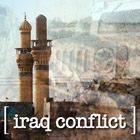
|
SENATE VOTES TO IMPOSE MARCH 2008 TIMELINE FOR WITHDRAWAL FROM IRAQ
SENATE VOTE MEANS BUSH WILL SEE TIMELINE FOR WITHDRAWAL IN LEGISLATION TO FUND IRAQ WHEN IT REACHES HIS DESK 27 March 2007 The United States Senate has voted to impose a timeline for withdrawal from Iraq by March 2008. The move comes only days after the House voted to include a deadline for withdrawal in its war-funding legislation. The Senate has not yet passed the full funding bill, but it is unlikely the wording will now be altered or removed. The vote marks the strongest challenge yet from the US Senate to the war policy of the Bush administration. President Bush has said he will veto any legislation that includes a timeline for withdrawal, though in this case he would have to veto the entire budget for funding the war in Iraq itself. The Seattle Times writes that the Senate is "headed toward passage today of a funding bill that would include a withdrawal timetable for U.S. combat troops and would set benchmarks for the Iraqi government, two weeks after rejecting a resolution with virtually identical language". The Senate was able to defeat a Republican-proposed amendment to war-funding legislation that would strike all language placing a timeline for withdrawal as a condition on funding when Sen. Chuck Hagel (R-NE) changed his position and declared on the Senate floor that he will "not support sustaining a flawed and failing policy. It's now time for the Congress to step forward and establish responsible boundaries and conditions for our continued military involvement in Iraq". The Senate must now approve the funding bill, and a conference committee comprised of members from both Houses must then craft compromise legislation that can pass both the House and Senate, before being sent to the president for signing. The legislation would put added pressure on the White House because a veto would mean refusing funding for the war effort. [s]
RELATED STORIES: Even as Pres. Bush has increased the troop "surge" to 28,000 additional soldiers in Baghdad, the US House today voted by simple majority to pass legislation requiring Bush to complete a "phased redeployment" of all combat personnel currently in Iraq by 2008. [Full Story] BUSH ANNOUNCES PLANS TO SEND 21,500 MORE SOLDIERS TO IRAQ After much speculation and many leaks, US pres. George W. Bush has announced he will send more than 20,000 additional soldiers into Iraq warzone, will require Iraqi government to take action against sectarian movements fomenting violence across Iraq. Bush also said that "Where mistakes have been made, the responsibility rests with me". [Full Story] SENATE REPORT SAYS HUSSEIN NEVER HAD AL-QAEDA TIES As the 5th anniversary of the attacks of 11 September 2001 approach, the US Senate's Intelligence Committee has issued a report officially finding that Saddam Hussein never collaborated with al-Qaeda in any sense. In fact, he was hunting Abu Musab al-Zarqawi, who would later name his organization "Al-Qaeda of Mesopotamia" or as per Pentagon briefings "Al-Qaeda in Iraq". [Full Story] DESPITE THOUSANDS OF CIVILIAN DEATHS, FEW MURDER CASES HAVE BEEN BROUGHT IN IRAQ WAR While prisoner abuse has been a widely reported charge, with shocking images and public outrage to keep attention on the subject, there has been relatively little similar public outrage expressed over situations where civilians have died in questionable circumstances. The Washington Post reports there has been a tendency not to investigate many such deaths, with top officials saying "in private" that there's "a tendency to consider Iraqi civilian deaths an unintended consequence of combat operations". [Full Story] MOST WANTED INSURGENT LEADER KILLED IN AIR-STRIKE Reports from Baghdad suggest Abu Musab al-Zarqawi was killed by a US airstrike on 7 June 2006. The official announcement was made by Iraq's prime minister Nouri al-Maliki, and was later confirmed by US Gen. Casey. The White House issued a statement of cautious relief, saying the removal of Zarqawi could be a moment of hope for Iraq, but will not end the ongoing sectarian and insurgent violence. [Full Story] NO WMD, JUSTIFICATIONS FOR WAR IN QUESTION David Kay, chief weapons inspector for the Iraq Survey Group, who recently left his post, reports there was no evidence to indicate the presence of any weapons of mass destruction, any stockpiles, or any competent programs to develop such weapons. Kay said evidence was found that indicated there had been programs in the past, but that it appeared that all the weapons had been destroyed, and that the programs were in disarray, and no production facilities existed. [Full Story] |
||||||||||
|
|||||||||||







